英语新概念2 Lesson 33 Out of darkness 同步教学课件(共68张PPT)
文档属性
| 名称 | 英语新概念2 Lesson 33 Out of darkness 同步教学课件(共68张PPT) | 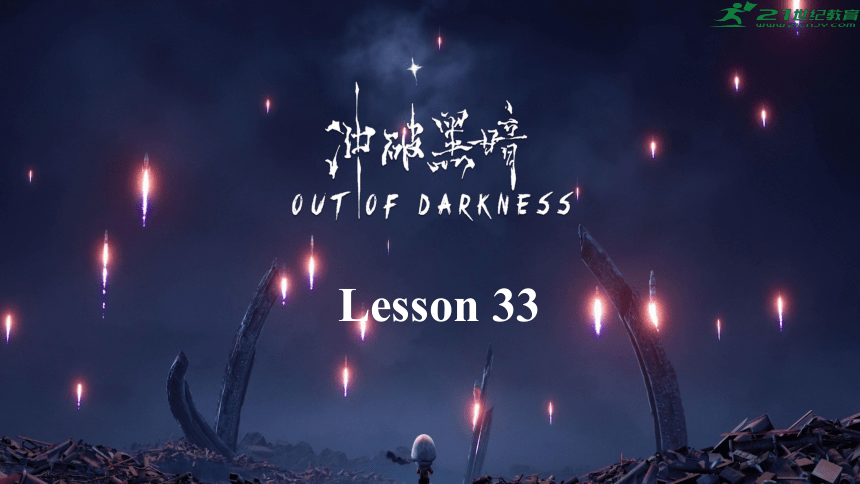 | |
| 格式 | pptx | ||
| 文件大小 | 5.9MB | ||
| 资源类型 | 试卷 | ||
| 版本资源 | 新概念英语 | ||
| 科目 | 英语 | ||
| 更新时间 | 2023-05-19 12:07:40 | ||
图片预览

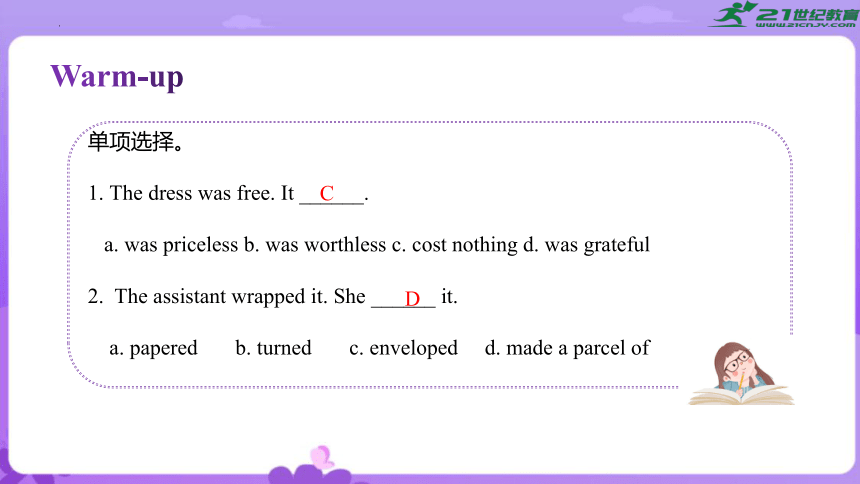

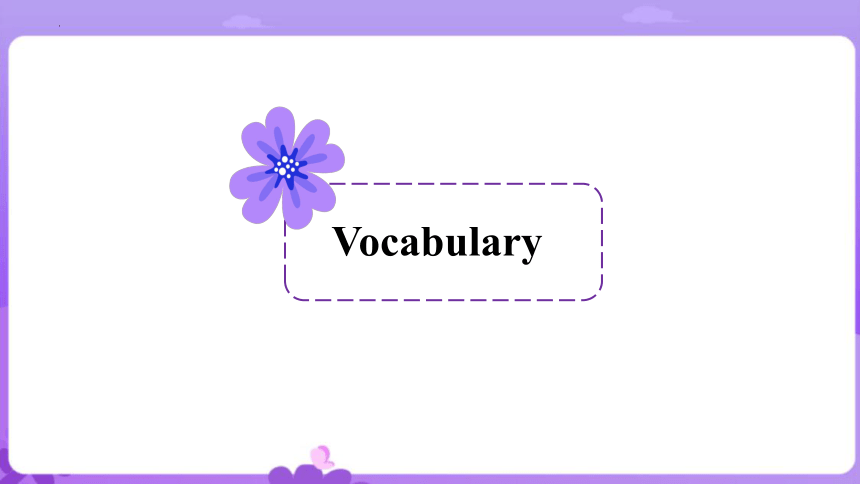
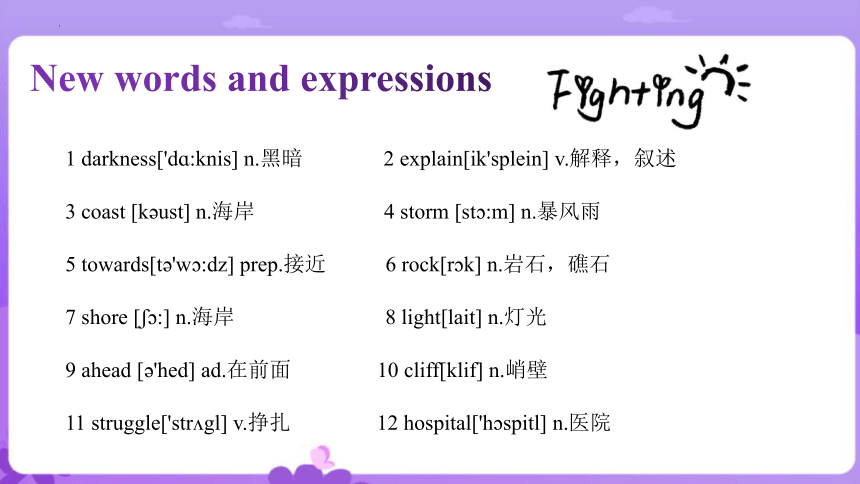
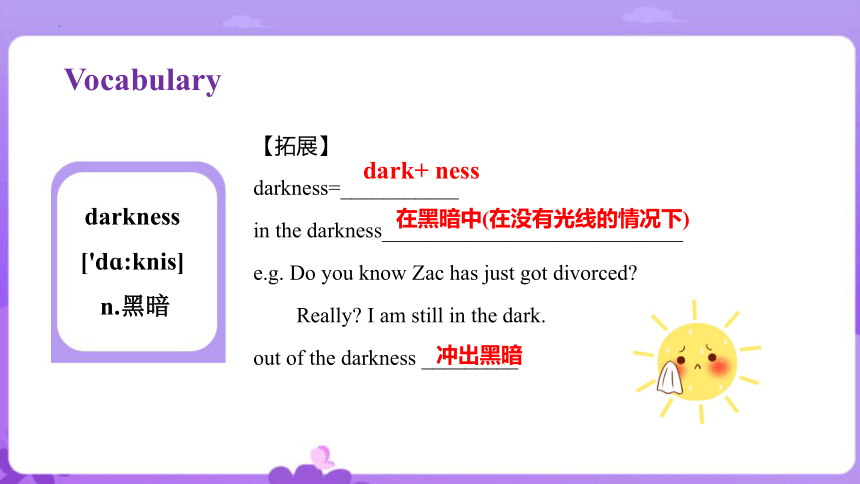
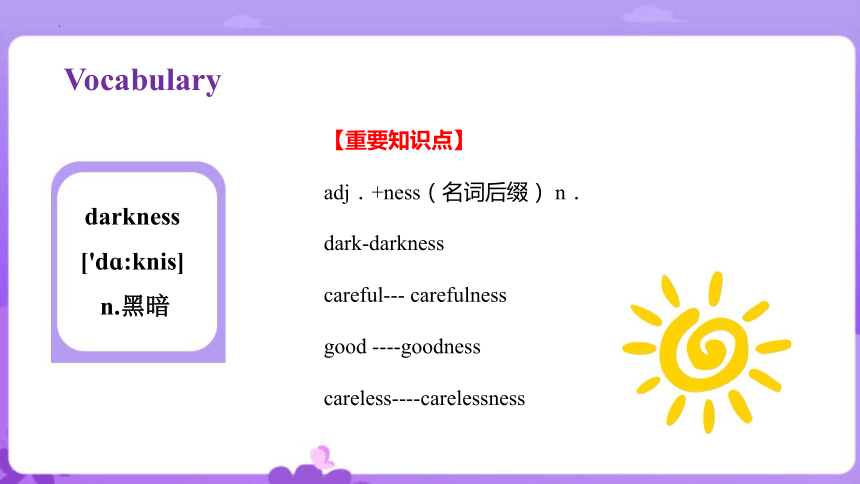
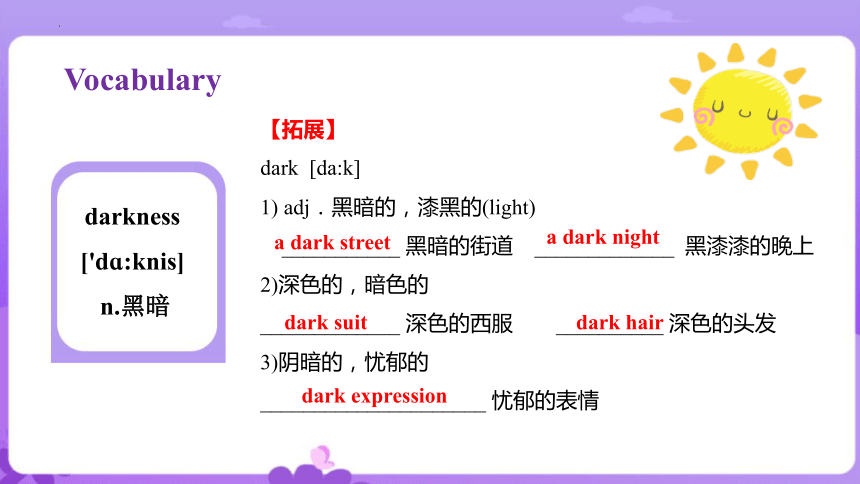
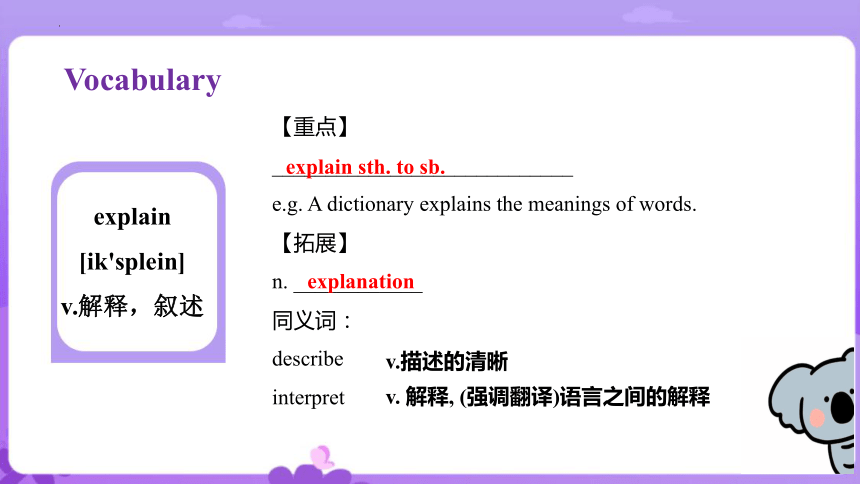
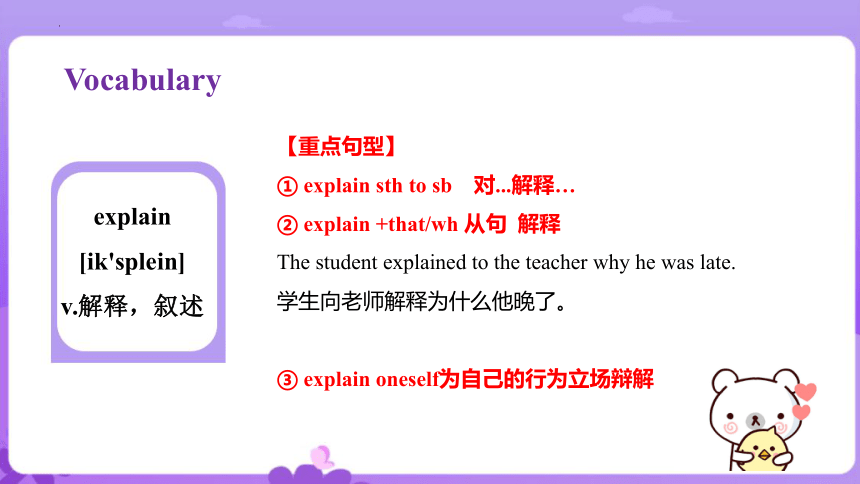
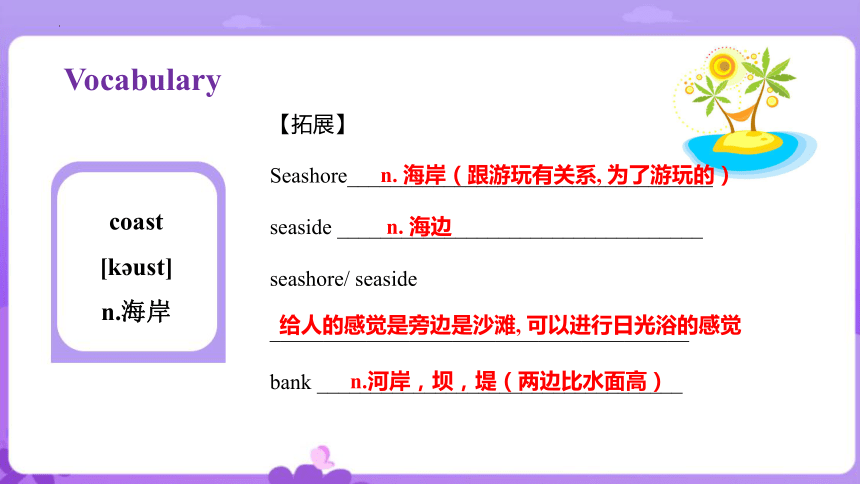
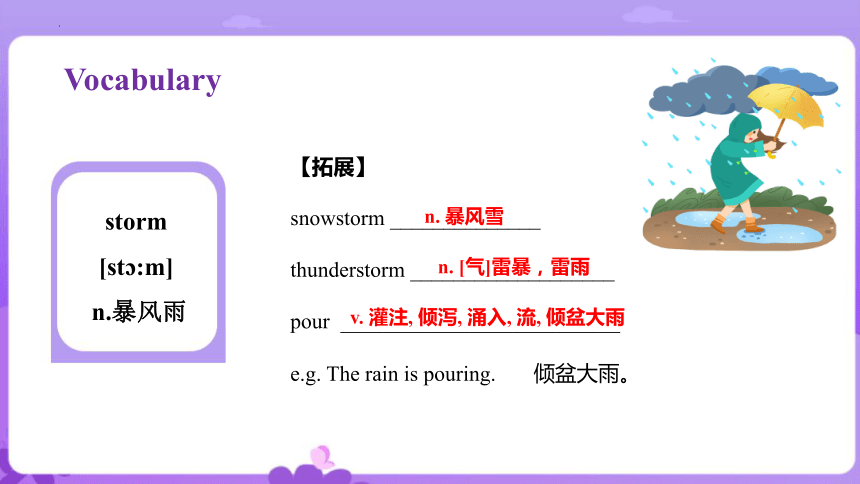
文档简介
(共68张PPT)
Lesson 33
Warm-up
单项选择。
1. The dress was free. It ______.
a. was priceless b. was worthless c. cost nothing d. was grateful
2. The assistant wrapped it. She ______ it.
a. papered b. turned c. enveloped d. made a parcel of
C
D
1.能在语境中正确运用本课的重点词汇;
2. 掌握方位介词的用法。
Vocabulary
New words and expressions
1 darkness['dɑ:knis] n.黑暗 2 explain[ik'splein] v.解释,叙述
3 coast [k ust] n.海岸 4 storm [st :m] n.暴风雨
5 towards[t 'w :dz] prep.接近 6 rock[r k] n.岩石,礁石
7 shore [ :] n.海岸 8 light[lait] n.灯光
9 ahead [ 'hed] ad.在前面 10 cliff[klif] n.峭壁
11 struggle['str gl] v.挣扎 12 hospital['h spitl] n.医院
【拓展】
darkness=___________
in the darkness____________________________
e.g. Do you know Zac has just got divorced
Really I am still in the dark.
out of the darkness _________
dark+ ness
在黑暗中(在没有光线的情况下)
冲出黑暗
darkness
['dɑ:knis]
n.黑暗
Vocabulary
【重要知识点】
adj.+ness(名词后缀) n.
dark-darkness
careful--- carefulness
good ----goodness
careless----carelessness
darkness
['dɑ:knis]
n.黑暗
Vocabulary
【拓展】
dark [da:k]
1) adj.黑暗的,漆黑的(light)
___________ 黑暗的街道 _____________ 黑漆漆的晚上
2)深色的,暗色的
_____________ 深色的西服 __________ 深色的头发
3)阴暗的,忧郁的
_____________________ 忧郁的表情
darkness
['dɑ:knis]
n.黑暗
Vocabulary
a dark street
a dark night
dark suit
dark hair
dark expression
explain
[ik'splein]
v.解释,叙述
Vocabulary
【重点】
____________________________
e.g. A dictionary explains the meanings of words.
【拓展】
n. ____________
同义词:
describe
interpret
explain sth. to sb.
explanation
v.描述的清晰
v. 解释, (强调翻译)语言之间的解释
【重点句型】
① explain sth to sb 对...解释…
② explain +that/wh 从句 解释
The student explained to the teacher why he was late.
学生向老师解释为什么他晚了。
③ explain oneself为自己的行为立场辩解
Vocabulary
explain
[ik'splein]
v.解释,叙述
【拓展】
Seashore__________________________________
seaside __________________________________
seashore/ seaside _______________________________________
bank __________________________________
coast
[k ust]
n.海岸
Vocabulary
n. 海边
给人的感觉是旁边是沙滩, 可以进行日光浴的感觉
n.河岸,坝,堤(两边比水面高)
n. 海岸(跟游玩有关系, 为了游玩的)
【拓展】
snowstorm ______________
thunderstorm ___________________
pour __________________________
e.g. The rain is pouring. 倾盆大雨。
Vocabulary
n. 暴风雪
storm
[st :m]
n.暴风雨
n. [气]雷暴,雷雨
v. 灌注, 倾泻, 涌入, 流, 倾盆大雨
【拓展】
1)n.风暴,暴风雪(常用构成复合词)
a rainstorm 暴风雪 a snowstorm 暴雪
__________ 尘暴 ___________ 沙暴
a thunderstorm 大雷雨
brainstorm群策群力
eg. _________________________
(谚)雨过天晴,否极泰来。
Vocabulary
a dust storm
storm
[st :m]
n.暴风雨
a sandstorm
After a storm comes a calm.
【拓展】
2)(喝彩,责难等的)嘈杂声,(枪弹的)纷飞
_______________________ 暴雨般的鼓掌喝彩
3)________________________ 遭遇暴风雨
be caught in the rain 淋雨
eg. _____________________________
小事惹起的轩然大波小题大做,大惊小怪。
Vocabulary
a storm of applause
storm
[st :m]
n.暴风雨
be caught in a storm
A storm in a teacup.
【语言点】
向,接近_________________
【拓展】
to强调朝那个方向去
towards 也指朝那个方向去,但强调距离越来越近
upwards ________________
downwards ________________
forwards ________________
backwards ________________
afterwards ________________
walk towards sb
adv. 向上
adv 向下
向前
adv.然后, 后来地
向后
towards
[t 'w :dz]
prep.接近
Vocabulary
【例】_________________________________
这些房子被建在岩石上面。
____________________ 爬上岩石
v.摇动,震动,晃动
Rock your body, everybody. 摇动你的身体,晃动身体。
______________ 摇滚乐
20世纪50年代由黑人音乐和西部乡村音乐混合而成
rock
[r k]
n.岩石,礁石
Vocabulary
The house is built on a rock.
climb up a rock
rock 'n' roll
【词组】
_____________ 在海滨上,陆上;
______________ 在离岸的海上,近海的;
_______________近岸的;
______________ 上陆,上岸
【用法】 shore滨、岸:指邻接海、河、湖边缘的陆地。
shore
[ :]
n.海岸
Vocabulary
in shore
on shore
off shore
go on shore
【重点】
ahead of… _________________
e.g. He went ahead of me. 他走在我前面
go ahead ________________________________
e.g. --Would you mind my using your telephone
--Ok, go ahead.
【拓展】
a开头的词(asleep,awake,alive,ahead,alight…)往往是表语形容词。放在被修饰词的后面作定语, 定语后置
light ahead ____________
在……前面
朝前走;请随便(回答请求时用)
前方的灯光
Vocabulary
ahead
[ 'hed]
ad.在前面
【短语】
struggle with sb. ___________________
e.g. The shopkeeper struggled with the thief.
struggle to do sth. __________________
e.g. He struggled to control his temper.
格斗,扭打
奋力去做某事
struggle
['str gl]
v.挣扎
Vocabulary
【拓展】
1) n.光线,光亮
_________________ 阳光
_________________ 灯光
_________________ 火光
light
[lait]
n.灯光
Vocabulary
the light of the fire
the light of the sun
the light of the lamp
2) n.光源,尤指电灯
___________________ 打开灯
__________________ 关掉灯
例: From the TV tower, we can see the lights of Beijing.
从电视塔上,我们可以看到北京的万家灯火。
3)n.火柴,打火机等的火
eg. ___________________________ 能借个火吗?
light
[lait]
n.灯光
Vocabulary
Can you give me a light
turn on the light
turn off the tight
【拓展】
___________________________ 站在悬崖边上
______________________________
在高高的峭壁上的灯塔。
cliff
[klif]
n.峭壁
Vocabulary
stand on the edge of a cliff
The light is high up on the cliffs.
【拓展】
______________________ 急诊医院
___________________________________ 住院
_________________________ 出院
住院,出院在美语中要加the
在英语中则通常不加the
hospital
['h spitl]
n.医院
Vocabulary
an emergency hospital
go into (the) hospital / be in (the) hospital
leave (the) hospital
Text
Nearly a week passed before the girl was able to explain what had happened to her. One afternoon she set out from the coast in a small boat and was caught in a storm. Towards evening, the boat struck a rock and the girl jumped into the sea. Then she swam to the shore after spending the whole night in the water. During that time she covered a distance of eight miles. Early next morning, she saw a light ahead. She knew she was near the shore because the light was high up on the cliffs. On arriving at the shore, the girl struggled up the cliff towards the light she had seen. That was all she remembered. When she woke up a day later, she found herself in hospital.
Nearly a week passed before the girl was able to explain what had happened to her. One afternoon she set out from the coast in a small boat and was caught in a storm. Towards evening, the boat struck a rock and the girl jumped into the sea. Then she swam to the shore after spending the whole night in the water. During that time she covered a distance of eight miles. Early next morning, she saw a light ahead. She knew she was near the shore because the light was high up on the cliffs. On arriving at the shore, the girl struggled up the cliff towards the light she had seen. That was all she remembered. When she woke up a day later, she found herself in hospital.
Nearly a week passed before the girl was able to explain what had happened to her.
【语言点】
nearly adv. 将近
nearly a week ___________________
was able to “能够”
be able to &can的区别
be able to ________________________
can ___________________
e.g. I can swim across the river.
e.g. I was able to swim across the river.
快一个星期了
强调有能力(经过努力)
只表示能力
Nearly a week passed before the girl was able to explain what had happened to her.
“一段时间以后”句型:
sometime later…
Three days later, my mother returned. (强调某人做某事,简单句)
Three days passed and then my mother returned.
并列句, 既强调某人做某事, 又强调时间(有多久)
passed before…
Three days passed before my mother returned.
强调时间(这么久的时间, 时间状语从句, 后面是从句)
One afternoon she set out from the coast in a small boat and was caught in a storm.
set out =____________________________
from这表示方位介词“从…”
set out from… ____________________
其相对的是 __________________
set off = begin a journey 出发
从……出发
to/towards…“去… ”
One afternoon she set out from the coast in a small boat and was caught in a storm.
set off 出发,使爆炸
这些烟火要格外小心,稍有火星就能引起爆炸。
Do be careful with those fireworks; the slightest spark could set them off.
set to 动手干, 认真开始干
Having enough data in hand, we can set to work. 手头有足够的资料我们可以开始工作了。
set about 开始, 着手
He set about learning Chinese at age ten. 他在十岁时开始学中文。
One afternoon she set out from the coast in a small boat and was caught in a storm.
“遇上”的不同表达法:meet,be caught in, bump into/run into
be caught是catch的被动语态,表示“被抓住”的意思。
be caught in往往是指遇上"灾难、困难”。
e. g. I was caught in a shower on the way home.
bump into sb.和run into sb.都是指“偶然遇上、碰巧遇上”某人的意思。
Towards evening, the boat struck a rock and the girl jumped into the sea.
天越来越晚
Suddenly, one of the children kicked a ball very hard and it went towards / to a passing boat.
但towards可以表示时间,含义为 “接近” 或 “将近”,而 to 并无此含义
Then she swam to the shore after spending the whole night in the water.
整晚
after引导时间状语,这里是介词,后面用动词ing
swim to ________,to表示_______
to & towards的区别
to______________________________________
towards__________________________________
游到
到….
强调朝那个方向去, 但没有强调越来越近
朝那个方向去,强调距离越来越近
During that time she covered a distance of eight miles.
cover 可笼统地表示“行过(一段路程)”根据上下文可具体译为“走过、飞过、游过”等。
The bird covered the distance in three minutes.
a distance of+具体长度 多长的距离,表示具体的距离
the red army covered a distance of 25000… 两万五千里长征
Early next morning, she saw a light ahead.
next:
1)the day after 第二天
We arrived in Paris on Tuesday evening.
The next day we went sightseeing.
星期二晚上我们到达巴黎。第二天我们去观光。
2)a few days ago 数天前,日前
I saw Mary the other day. 日前我见到了玛丽。
Early next morning, she saw a light ahead.
ahead
Go ahead of her.(动态) 走在她的前面
She sits in front of me.(静态) 她坐在我前面。
ahead of time 事先
Can you tell me ahead of time if you’re coming
go ahead 去吧
a light ahead 前方的一盏灯(ahead 放在被修饰词的后面)
She knew she was near the shore because the light was high up on the cliffs.
she was near the shore 作know的宾语,know后省略引导词that.
because引导_____状语从句
up是形容__________________________.
high是副词,修饰up.
原因
在上面的,高高的,在较高处
on=______________________________________引导_____状语,这里是介词,所以用________
On hearing the news, she fainted. = When she heard the news, she faint .
刚到家,天就开始下雨了。
as soon as/when “一….就….”/“当…的时候”
时间
动词ing
On arriving at the shore, the girl struggled up the cliff towards the light she had seen.
On arriving at the shore, the girl struggled up the cliff towards the light she had seen.
up是方位介词,表示______________.
反义词是________
“沿着…向上”
down
That was all she remembered.
all作表语,是先行词, she remember 修饰 all 作定语从句, 省略 that
e.g.That was all I wanted to say.
That was all I wanted to say. 那就是我想说的全部
That was all I can do for you.=I can do nothing else for you.
When she woke up a day later, she found herself in hospital.
wake up ___________
wake sb up___________
find +宾语+宾补 “ 发现……”(宾补可以由形容词或介词短语充当)
e.g. I find the books tidy.
e.g. I found the books in order.
醒来
把某人叫醒
When she woke up a day later, she found herself in hospital.
短语:
in hospital 在住院 in the hospital 在医院里
go to school 去上学 go to the school 去学校
go to church 去做礼拜 go to the church 去教堂
1 The girl was in the boat_________
(a) all day
(b) all night
(c) for about ten hours
(d) for about four hours
2 The girl woke up in hospital a day later__________
(a) and explained what had happened to her
(b) but some time passed before she could explain what had happened to her
(c) and at once remembered what had happened to her
(d) but never remembered what had happened to her
Questions:
b
b
Grammar
方 向 介 词
Grammar
表示方向、目标的介词的用法表方向、目标的常用介词有:
1. to;swim to the shore 向岸边游去; fly to New York飞往纽约
2. toward: struggle up the cliff toward the light沿着悬崖向灯光处挣扎爬去
3. for :make for the exit向出口处走去; set out/off for the beach出发前往海滩;
leave for Beijing 启程前往北京
4, into:jump into the sea跳入海中
5. at: aim at the bird 向鸟瞄准; shoot at the enemy 向敌人射击;
throw a stone at the dog向狗扔石头; point at people用手指人
方位介词
Grammar
1. 上、下 :on-off; up-down
2.来、去:from; to; for; towards
e.g. She went towards the shop quickly.
3.进去、出来:into-out of;
4.在某个地方,在……里面/外面:at; in; out of
5.穿过:across; through
1. phrases with from and to
from door to door 挨家挨户
from cover to cover 从头读到尾
from beginning to end 从头到尾
from China to England 从中国到英国
from hand to mouth 所挣的钱仅够糊口
eg. He flew to Washington last night. He will be flying from Washington to Chicago on Wednesday.
他在昨天晚上飞往华盛顿。他将于周三从华盛顿飞往芝加哥。
方 向 介 词
Grammar
2. phrases with into and out of
1)into: entrance 进入
in: position 在...里;在...地方
2) out of: exit 离开,出去
Where is Carol -- She has just gone into the kitchen.
Where did you throw that piece of paper -- I threw it out of the window.
Grammar
方 向 介 词
3. phrases with for
for: the destination for journey 一个旅途的目的地
【例】We set out for the village at six o' clock next morning.
我们第二天早上6点出发去那个村庄。
George has left for Scotland. 乔治己动身去苏格兰了。
leave somewhere 离开某地
leave for somewhere 离开去某地
Grammar
方 向 介 词
4. phrases with towards
towards: direction approaching a place朝着
【例】The car came towards me.车朝我开来了。
She swam towards the shore. 她朝岸边游了过去。
She swam to the shore. 她游到到了岸边。
Grammar
方 向 介 词
5. phrases with at
at放某些动词后含有“不礼貌”“攻击性”的含义。
【例】She threw the ball to me. 她把球扔给了我。
The boy threw a stone at the dog.这个男孩拿石头砸向了狗。
Don‘ t shout at others. 不要对别人大喊大叫。
It is rude to point at people. 用手指着别人是不礼貌的。
Grammar
方 向 介 词
1. Tell him to come my office.I want to speak to him.
2. The ship sailed the harbour and disappeared from sight.
3. We climbed the top of the the mountain.
4. The team set out Australia yesterday
5. This ship sails Venice London once a week.
6. He aimed the bird, fired, and missed.
7. Please bring these things the kitchen for me.
8. Have you received a letter Alan yet
Exercises
to
into / out of
to
for
from
to
at
to
from
1. I tried to telephone you . You must have been out. (the other day/the next day)
我前几天给你打电话,你出去了。
2. Have you your driving test (past/passed)
你通过驾驶考试了吗?
3. On the first day all went well. But on the day there was a storm. (next/other)
第一天还是一切正常,但是第二天就有暴风雨。
4. The crowd cheered as the soldiers marched . (past/passed)
当士兵队伍经过的时候,人群欢呼雀跃。
Exercises
the other day
passed
next
past
Grammar
pass 和 past 的区别主要是词义上的区别,
pass 是动词,其过去式为 passed,过去分词是 passed 或 past。
当作及物动词用时,可表示“经过,通过(考试),超过”等,作不及物动词用时可表示“(时间等)消逝”。
Your sister passed me in her new car, driving great speed.
I’ve passed/past my French test.
pass & past
Grammar
pass 和 past 的区别主要是词义上的区别,
past 可以作形容词、介词、名词等, 作形容词时表示“以前的,过去的”等; 作介词时表示“经过,
超出(范围等)”;作名词时表示“过去,昔时,往事”等。
Frank is proud of his past experience.
I go past the garden.
Can you tell me something about your past
pass & past
Grammar
next 表示时间顺序上“紧接的,下一个”,如果以现在为基准,则 next 前一般不加 the;如果以过去或将来的某一时间为基准,则 next 前面要加 the 或其他修饰词。
next day 第二天
Mary phoned the next day to tell us that she couldn’t come to the party.
第二天玛丽打来电话告诉我们她不能参加晚会了。
Next & Other
Grammar
next 表示时间顺序上“紧接的,下一个”,如果以现在为基准,则 next 前一般不加 the;如果以过去或将来的某一时间为基准,则 next 前面要加 the 或其他修饰词。
the other day =a few days ago (几天前),
Mary phoned the other day to tell us that she had arrived in London.
前几天玛丽来电话告诉我们她已到达伦敦。
the other day 出现一定是过去时;next day 有可能是过去式, 有可能是将来式
Next & Other
1. She swam to the shore ______ the night in the water.
a. having spent b. having spending c. when spending d. had spent
2. How ______ was the shore Eight miles.
a. away far b. far from c. far away d. long
Grammar
A
C
Practice
用所给单词或短语的正确形式填空
1.We ________________ in a rainstorm on the way here.
2.Johnny _______________ to keep up with his father, but he was always one step behind.
3.A snowball ________________ him on the back of the head.
4.Kate ________________ for the house on the other side of the bay.
5.I’ll ________ you ________when it’s time to leave.
6.How many hours will it take to ________ 750 km if a car is traveling at 100km per hour
struggle be caught in cover a/the distance (of) set out strike wake up
选择正确的词或短语完成句子
1.Two years ________ (pass) before they met each other again at the party.
2.Let me explain what ________ (happen) to her last week.
3.—George and Lucy got married last week. Did you go to their wedding
—No, I ________(not invite). Did they have a big wedding
4.They went to the seaside after ________ (finish) their homework.
5.The old lady broke down on ________ (hear) her son’s death.
6.That was all I ________ (can) think of at the moment.
单项选择
1. I was just going to cut my rose bushes but someone ______it. Was it you
[A] has done [B] had done
[C] would do [D] will do
D
单项选择
2. Scientists say it may be five or six years _____ it is possible to test this medicine on human patients.
[A] since [B] after
[C] before [D] when
C
3. —Could you do me a favour
—It depends on _______ it is.
[A] which [B] whichever
[C] what [D] whatever
4. John thinks it won’t be long ______ he is ready for his new job.
[A] when [B] after
[C] before [D] since
C
C
根据汉语提示完成下列句子。
1.闲逛了半天之后,他发现自己又回到了酒店。
After wandering around for half a day, he found himself ________________.
2.汤姆和玛丽1985年结婚,两年后他们离婚了。
Tom and Mary got married in 1985. ________________, they were divorced.
根据汉语提示完成下列句子。
3.三个人从窗户跳下去逃生了。
Three people saved themselves by ________________.
4.他朝车站走去。
He headed________________.
Lesson 33
darkness, explain , coast , storm, towards, rock, shore, light, ahead, cliff, struggle, hospital
方位介词
Lesson 33
Warm-up
单项选择。
1. The dress was free. It ______.
a. was priceless b. was worthless c. cost nothing d. was grateful
2. The assistant wrapped it. She ______ it.
a. papered b. turned c. enveloped d. made a parcel of
C
D
1.能在语境中正确运用本课的重点词汇;
2. 掌握方位介词的用法。
Vocabulary
New words and expressions
1 darkness['dɑ:knis] n.黑暗 2 explain[ik'splein] v.解释,叙述
3 coast [k ust] n.海岸 4 storm [st :m] n.暴风雨
5 towards[t 'w :dz] prep.接近 6 rock[r k] n.岩石,礁石
7 shore [ :] n.海岸 8 light[lait] n.灯光
9 ahead [ 'hed] ad.在前面 10 cliff[klif] n.峭壁
11 struggle['str gl] v.挣扎 12 hospital['h spitl] n.医院
【拓展】
darkness=___________
in the darkness____________________________
e.g. Do you know Zac has just got divorced
Really I am still in the dark.
out of the darkness _________
dark+ ness
在黑暗中(在没有光线的情况下)
冲出黑暗
darkness
['dɑ:knis]
n.黑暗
Vocabulary
【重要知识点】
adj.+ness(名词后缀) n.
dark-darkness
careful--- carefulness
good ----goodness
careless----carelessness
darkness
['dɑ:knis]
n.黑暗
Vocabulary
【拓展】
dark [da:k]
1) adj.黑暗的,漆黑的(light)
___________ 黑暗的街道 _____________ 黑漆漆的晚上
2)深色的,暗色的
_____________ 深色的西服 __________ 深色的头发
3)阴暗的,忧郁的
_____________________ 忧郁的表情
darkness
['dɑ:knis]
n.黑暗
Vocabulary
a dark street
a dark night
dark suit
dark hair
dark expression
explain
[ik'splein]
v.解释,叙述
Vocabulary
【重点】
____________________________
e.g. A dictionary explains the meanings of words.
【拓展】
n. ____________
同义词:
describe
interpret
explain sth. to sb.
explanation
v.描述的清晰
v. 解释, (强调翻译)语言之间的解释
【重点句型】
① explain sth to sb 对...解释…
② explain +that/wh 从句 解释
The student explained to the teacher why he was late.
学生向老师解释为什么他晚了。
③ explain oneself为自己的行为立场辩解
Vocabulary
explain
[ik'splein]
v.解释,叙述
【拓展】
Seashore__________________________________
seaside __________________________________
seashore/ seaside _______________________________________
bank __________________________________
coast
[k ust]
n.海岸
Vocabulary
n. 海边
给人的感觉是旁边是沙滩, 可以进行日光浴的感觉
n.河岸,坝,堤(两边比水面高)
n. 海岸(跟游玩有关系, 为了游玩的)
【拓展】
snowstorm ______________
thunderstorm ___________________
pour __________________________
e.g. The rain is pouring. 倾盆大雨。
Vocabulary
n. 暴风雪
storm
[st :m]
n.暴风雨
n. [气]雷暴,雷雨
v. 灌注, 倾泻, 涌入, 流, 倾盆大雨
【拓展】
1)n.风暴,暴风雪(常用构成复合词)
a rainstorm 暴风雪 a snowstorm 暴雪
__________ 尘暴 ___________ 沙暴
a thunderstorm 大雷雨
brainstorm群策群力
eg. _________________________
(谚)雨过天晴,否极泰来。
Vocabulary
a dust storm
storm
[st :m]
n.暴风雨
a sandstorm
After a storm comes a calm.
【拓展】
2)(喝彩,责难等的)嘈杂声,(枪弹的)纷飞
_______________________ 暴雨般的鼓掌喝彩
3)________________________ 遭遇暴风雨
be caught in the rain 淋雨
eg. _____________________________
小事惹起的轩然大波小题大做,大惊小怪。
Vocabulary
a storm of applause
storm
[st :m]
n.暴风雨
be caught in a storm
A storm in a teacup.
【语言点】
向,接近_________________
【拓展】
to强调朝那个方向去
towards 也指朝那个方向去,但强调距离越来越近
upwards ________________
downwards ________________
forwards ________________
backwards ________________
afterwards ________________
walk towards sb
adv. 向上
adv 向下
向前
adv.然后, 后来地
向后
towards
[t 'w :dz]
prep.接近
Vocabulary
【例】_________________________________
这些房子被建在岩石上面。
____________________ 爬上岩石
v.摇动,震动,晃动
Rock your body, everybody. 摇动你的身体,晃动身体。
______________ 摇滚乐
20世纪50年代由黑人音乐和西部乡村音乐混合而成
rock
[r k]
n.岩石,礁石
Vocabulary
The house is built on a rock.
climb up a rock
rock 'n' roll
【词组】
_____________ 在海滨上,陆上;
______________ 在离岸的海上,近海的;
_______________近岸的;
______________ 上陆,上岸
【用法】 shore滨、岸:指邻接海、河、湖边缘的陆地。
shore
[ :]
n.海岸
Vocabulary
in shore
on shore
off shore
go on shore
【重点】
ahead of… _________________
e.g. He went ahead of me. 他走在我前面
go ahead ________________________________
e.g. --Would you mind my using your telephone
--Ok, go ahead.
【拓展】
a开头的词(asleep,awake,alive,ahead,alight…)往往是表语形容词。放在被修饰词的后面作定语, 定语后置
light ahead ____________
在……前面
朝前走;请随便(回答请求时用)
前方的灯光
Vocabulary
ahead
[ 'hed]
ad.在前面
【短语】
struggle with sb. ___________________
e.g. The shopkeeper struggled with the thief.
struggle to do sth. __________________
e.g. He struggled to control his temper.
格斗,扭打
奋力去做某事
struggle
['str gl]
v.挣扎
Vocabulary
【拓展】
1) n.光线,光亮
_________________ 阳光
_________________ 灯光
_________________ 火光
light
[lait]
n.灯光
Vocabulary
the light of the fire
the light of the sun
the light of the lamp
2) n.光源,尤指电灯
___________________ 打开灯
__________________ 关掉灯
例: From the TV tower, we can see the lights of Beijing.
从电视塔上,我们可以看到北京的万家灯火。
3)n.火柴,打火机等的火
eg. ___________________________ 能借个火吗?
light
[lait]
n.灯光
Vocabulary
Can you give me a light
turn on the light
turn off the tight
【拓展】
___________________________ 站在悬崖边上
______________________________
在高高的峭壁上的灯塔。
cliff
[klif]
n.峭壁
Vocabulary
stand on the edge of a cliff
The light is high up on the cliffs.
【拓展】
______________________ 急诊医院
___________________________________ 住院
_________________________ 出院
住院,出院在美语中要加the
在英语中则通常不加the
hospital
['h spitl]
n.医院
Vocabulary
an emergency hospital
go into (the) hospital / be in (the) hospital
leave (the) hospital
Text
Nearly a week passed before the girl was able to explain what had happened to her. One afternoon she set out from the coast in a small boat and was caught in a storm. Towards evening, the boat struck a rock and the girl jumped into the sea. Then she swam to the shore after spending the whole night in the water. During that time she covered a distance of eight miles. Early next morning, she saw a light ahead. She knew she was near the shore because the light was high up on the cliffs. On arriving at the shore, the girl struggled up the cliff towards the light she had seen. That was all she remembered. When she woke up a day later, she found herself in hospital.
Nearly a week passed before the girl was able to explain what had happened to her. One afternoon she set out from the coast in a small boat and was caught in a storm. Towards evening, the boat struck a rock and the girl jumped into the sea. Then she swam to the shore after spending the whole night in the water. During that time she covered a distance of eight miles. Early next morning, she saw a light ahead. She knew she was near the shore because the light was high up on the cliffs. On arriving at the shore, the girl struggled up the cliff towards the light she had seen. That was all she remembered. When she woke up a day later, she found herself in hospital.
Nearly a week passed before the girl was able to explain what had happened to her.
【语言点】
nearly adv. 将近
nearly a week ___________________
was able to “能够”
be able to &can的区别
be able to ________________________
can ___________________
e.g. I can swim across the river.
e.g. I was able to swim across the river.
快一个星期了
强调有能力(经过努力)
只表示能力
Nearly a week passed before the girl was able to explain what had happened to her.
“一段时间以后”句型:
sometime later…
Three days later, my mother returned. (强调某人做某事,简单句)
Three days passed and then my mother returned.
并列句, 既强调某人做某事, 又强调时间(有多久)
passed before…
Three days passed before my mother returned.
强调时间(这么久的时间, 时间状语从句, 后面是从句)
One afternoon she set out from the coast in a small boat and was caught in a storm.
set out =____________________________
from这表示方位介词“从…”
set out from… ____________________
其相对的是 __________________
set off = begin a journey 出发
从……出发
to/towards…“去… ”
One afternoon she set out from the coast in a small boat and was caught in a storm.
set off 出发,使爆炸
这些烟火要格外小心,稍有火星就能引起爆炸。
Do be careful with those fireworks; the slightest spark could set them off.
set to 动手干, 认真开始干
Having enough data in hand, we can set to work. 手头有足够的资料我们可以开始工作了。
set about 开始, 着手
He set about learning Chinese at age ten. 他在十岁时开始学中文。
One afternoon she set out from the coast in a small boat and was caught in a storm.
“遇上”的不同表达法:meet,be caught in, bump into/run into
be caught是catch的被动语态,表示“被抓住”的意思。
be caught in往往是指遇上"灾难、困难”。
e. g. I was caught in a shower on the way home.
bump into sb.和run into sb.都是指“偶然遇上、碰巧遇上”某人的意思。
Towards evening, the boat struck a rock and the girl jumped into the sea.
天越来越晚
Suddenly, one of the children kicked a ball very hard and it went towards / to a passing boat.
但towards可以表示时间,含义为 “接近” 或 “将近”,而 to 并无此含义
Then she swam to the shore after spending the whole night in the water.
整晚
after引导时间状语,这里是介词,后面用动词ing
swim to ________,to表示_______
to & towards的区别
to______________________________________
towards__________________________________
游到
到….
强调朝那个方向去, 但没有强调越来越近
朝那个方向去,强调距离越来越近
During that time she covered a distance of eight miles.
cover 可笼统地表示“行过(一段路程)”根据上下文可具体译为“走过、飞过、游过”等。
The bird covered the distance in three minutes.
a distance of+具体长度 多长的距离,表示具体的距离
the red army covered a distance of 25000… 两万五千里长征
Early next morning, she saw a light ahead.
next:
1)the day after 第二天
We arrived in Paris on Tuesday evening.
The next day we went sightseeing.
星期二晚上我们到达巴黎。第二天我们去观光。
2)a few days ago 数天前,日前
I saw Mary the other day. 日前我见到了玛丽。
Early next morning, she saw a light ahead.
ahead
Go ahead of her.(动态) 走在她的前面
She sits in front of me.(静态) 她坐在我前面。
ahead of time 事先
Can you tell me ahead of time if you’re coming
go ahead 去吧
a light ahead 前方的一盏灯(ahead 放在被修饰词的后面)
She knew she was near the shore because the light was high up on the cliffs.
she was near the shore 作know的宾语,know后省略引导词that.
because引导_____状语从句
up是形容__________________________.
high是副词,修饰up.
原因
在上面的,高高的,在较高处
on=______________________________________引导_____状语,这里是介词,所以用________
On hearing the news, she fainted. = When she heard the news, she faint .
刚到家,天就开始下雨了。
as soon as/when “一….就….”/“当…的时候”
时间
动词ing
On arriving at the shore, the girl struggled up the cliff towards the light she had seen.
On arriving at the shore, the girl struggled up the cliff towards the light she had seen.
up是方位介词,表示______________.
反义词是________
“沿着…向上”
down
That was all she remembered.
all作表语,是先行词, she remember 修饰 all 作定语从句, 省略 that
e.g.That was all I wanted to say.
That was all I wanted to say. 那就是我想说的全部
That was all I can do for you.=I can do nothing else for you.
When she woke up a day later, she found herself in hospital.
wake up ___________
wake sb up___________
find +宾语+宾补 “ 发现……”(宾补可以由形容词或介词短语充当)
e.g. I find the books tidy.
e.g. I found the books in order.
醒来
把某人叫醒
When she woke up a day later, she found herself in hospital.
短语:
in hospital 在住院 in the hospital 在医院里
go to school 去上学 go to the school 去学校
go to church 去做礼拜 go to the church 去教堂
1 The girl was in the boat_________
(a) all day
(b) all night
(c) for about ten hours
(d) for about four hours
2 The girl woke up in hospital a day later__________
(a) and explained what had happened to her
(b) but some time passed before she could explain what had happened to her
(c) and at once remembered what had happened to her
(d) but never remembered what had happened to her
Questions:
b
b
Grammar
方 向 介 词
Grammar
表示方向、目标的介词的用法表方向、目标的常用介词有:
1. to;swim to the shore 向岸边游去; fly to New York飞往纽约
2. toward: struggle up the cliff toward the light沿着悬崖向灯光处挣扎爬去
3. for :make for the exit向出口处走去; set out/off for the beach出发前往海滩;
leave for Beijing 启程前往北京
4, into:jump into the sea跳入海中
5. at: aim at the bird 向鸟瞄准; shoot at the enemy 向敌人射击;
throw a stone at the dog向狗扔石头; point at people用手指人
方位介词
Grammar
1. 上、下 :on-off; up-down
2.来、去:from; to; for; towards
e.g. She went towards the shop quickly.
3.进去、出来:into-out of;
4.在某个地方,在……里面/外面:at; in; out of
5.穿过:across; through
1. phrases with from and to
from door to door 挨家挨户
from cover to cover 从头读到尾
from beginning to end 从头到尾
from China to England 从中国到英国
from hand to mouth 所挣的钱仅够糊口
eg. He flew to Washington last night. He will be flying from Washington to Chicago on Wednesday.
他在昨天晚上飞往华盛顿。他将于周三从华盛顿飞往芝加哥。
方 向 介 词
Grammar
2. phrases with into and out of
1)into: entrance 进入
in: position 在...里;在...地方
2) out of: exit 离开,出去
Where is Carol -- She has just gone into the kitchen.
Where did you throw that piece of paper -- I threw it out of the window.
Grammar
方 向 介 词
3. phrases with for
for: the destination for journey 一个旅途的目的地
【例】We set out for the village at six o' clock next morning.
我们第二天早上6点出发去那个村庄。
George has left for Scotland. 乔治己动身去苏格兰了。
leave somewhere 离开某地
leave for somewhere 离开去某地
Grammar
方 向 介 词
4. phrases with towards
towards: direction approaching a place朝着
【例】The car came towards me.车朝我开来了。
She swam towards the shore. 她朝岸边游了过去。
She swam to the shore. 她游到到了岸边。
Grammar
方 向 介 词
5. phrases with at
at放某些动词后含有“不礼貌”“攻击性”的含义。
【例】She threw the ball to me. 她把球扔给了我。
The boy threw a stone at the dog.这个男孩拿石头砸向了狗。
Don‘ t shout at others. 不要对别人大喊大叫。
It is rude to point at people. 用手指着别人是不礼貌的。
Grammar
方 向 介 词
1. Tell him to come my office.I want to speak to him.
2. The ship sailed the harbour and disappeared from sight.
3. We climbed the top of the the mountain.
4. The team set out Australia yesterday
5. This ship sails Venice London once a week.
6. He aimed the bird, fired, and missed.
7. Please bring these things the kitchen for me.
8. Have you received a letter Alan yet
Exercises
to
into / out of
to
for
from
to
at
to
from
1. I tried to telephone you . You must have been out. (the other day/the next day)
我前几天给你打电话,你出去了。
2. Have you your driving test (past/passed)
你通过驾驶考试了吗?
3. On the first day all went well. But on the day there was a storm. (next/other)
第一天还是一切正常,但是第二天就有暴风雨。
4. The crowd cheered as the soldiers marched . (past/passed)
当士兵队伍经过的时候,人群欢呼雀跃。
Exercises
the other day
passed
next
past
Grammar
pass 和 past 的区别主要是词义上的区别,
pass 是动词,其过去式为 passed,过去分词是 passed 或 past。
当作及物动词用时,可表示“经过,通过(考试),超过”等,作不及物动词用时可表示“(时间等)消逝”。
Your sister passed me in her new car, driving great speed.
I’ve passed/past my French test.
pass & past
Grammar
pass 和 past 的区别主要是词义上的区别,
past 可以作形容词、介词、名词等, 作形容词时表示“以前的,过去的”等; 作介词时表示“经过,
超出(范围等)”;作名词时表示“过去,昔时,往事”等。
Frank is proud of his past experience.
I go past the garden.
Can you tell me something about your past
pass & past
Grammar
next 表示时间顺序上“紧接的,下一个”,如果以现在为基准,则 next 前一般不加 the;如果以过去或将来的某一时间为基准,则 next 前面要加 the 或其他修饰词。
next day 第二天
Mary phoned the next day to tell us that she couldn’t come to the party.
第二天玛丽打来电话告诉我们她不能参加晚会了。
Next & Other
Grammar
next 表示时间顺序上“紧接的,下一个”,如果以现在为基准,则 next 前一般不加 the;如果以过去或将来的某一时间为基准,则 next 前面要加 the 或其他修饰词。
the other day =a few days ago (几天前),
Mary phoned the other day to tell us that she had arrived in London.
前几天玛丽来电话告诉我们她已到达伦敦。
the other day 出现一定是过去时;next day 有可能是过去式, 有可能是将来式
Next & Other
1. She swam to the shore ______ the night in the water.
a. having spent b. having spending c. when spending d. had spent
2. How ______ was the shore Eight miles.
a. away far b. far from c. far away d. long
Grammar
A
C
Practice
用所给单词或短语的正确形式填空
1.We ________________ in a rainstorm on the way here.
2.Johnny _______________ to keep up with his father, but he was always one step behind.
3.A snowball ________________ him on the back of the head.
4.Kate ________________ for the house on the other side of the bay.
5.I’ll ________ you ________when it’s time to leave.
6.How many hours will it take to ________ 750 km if a car is traveling at 100km per hour
struggle be caught in cover a/the distance (of) set out strike wake up
选择正确的词或短语完成句子
1.Two years ________ (pass) before they met each other again at the party.
2.Let me explain what ________ (happen) to her last week.
3.—George and Lucy got married last week. Did you go to their wedding
—No, I ________(not invite). Did they have a big wedding
4.They went to the seaside after ________ (finish) their homework.
5.The old lady broke down on ________ (hear) her son’s death.
6.That was all I ________ (can) think of at the moment.
单项选择
1. I was just going to cut my rose bushes but someone ______it. Was it you
[A] has done [B] had done
[C] would do [D] will do
D
单项选择
2. Scientists say it may be five or six years _____ it is possible to test this medicine on human patients.
[A] since [B] after
[C] before [D] when
C
3. —Could you do me a favour
—It depends on _______ it is.
[A] which [B] whichever
[C] what [D] whatever
4. John thinks it won’t be long ______ he is ready for his new job.
[A] when [B] after
[C] before [D] since
C
C
根据汉语提示完成下列句子。
1.闲逛了半天之后,他发现自己又回到了酒店。
After wandering around for half a day, he found himself ________________.
2.汤姆和玛丽1985年结婚,两年后他们离婚了。
Tom and Mary got married in 1985. ________________, they were divorced.
根据汉语提示完成下列句子。
3.三个人从窗户跳下去逃生了。
Three people saved themselves by ________________.
4.他朝车站走去。
He headed________________.
Lesson 33
darkness, explain , coast , storm, towards, rock, shore, light, ahead, cliff, struggle, hospital
方位介词
同课章节目录
- Unit 1 That's my father!
- Unit 2 This is our house.
- Unit 3 Get off the bed!
- Unit 4 It's time for lunch!
- Unit 5 That's Ted's puppet.
- Unit 6 This is my uncle's farm.
- Unit 7 What super food!
- Unit 8 They're Dad's shoes!
- Unit 9 They're happy dogs.
- Unit 10 What pretty flowers!
- Unit 11 Nineteen bones in the house!
- Unit 12 Hide behind the bush!
- Unit 13 I can dance!
- Unit 14 They're amazing!
- Unit 15 Let's play football!
